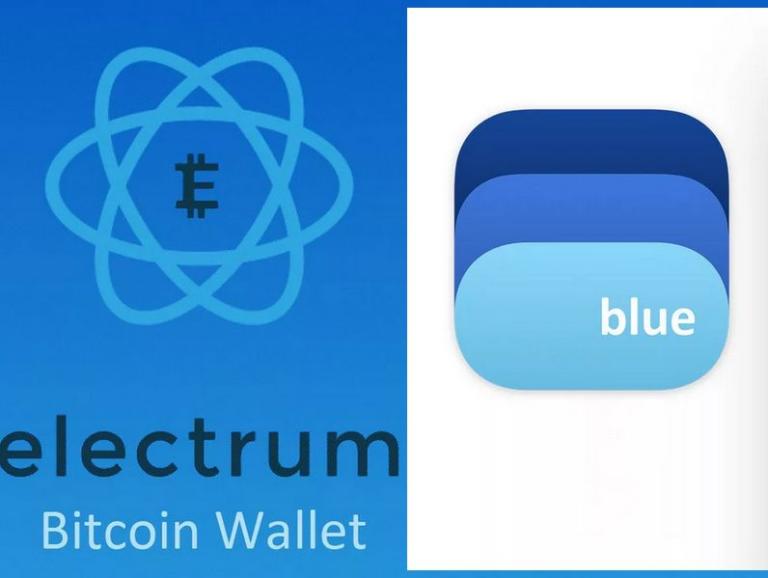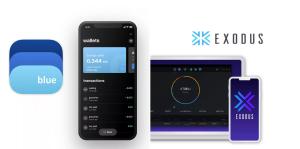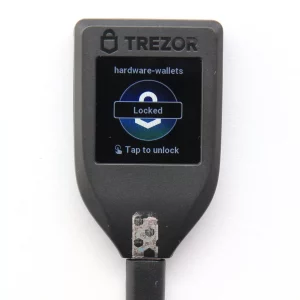Electrum and BlueWallet are Bitcoin-only wallets that are each made for distinct user preferences, experience, and requirements. While BlueWallet offers a desktop app for macOS and a mobile app for both iOS and Android, Electrum is available for desktops (Windows, Mac, Linux) but only for Android among mobile platforms. Electrum was founded in 2011 while BlueWallet was launched in 2017.
Having tried both Electrum and BlueWallet, I can offer some insights into their strengths and weaknesses, helping you decide which one might be a better fit.
Electrum Wallet
Electrum is known in the Bitcoin community for its robust feature set and lightweight design. It focuses on fast performance, minimal resource consumption, and a user-friendly Bitcoin experience. It achieves rapid startup times by using high-powered servers that manage the more complex aspects of the Bitcoin network. Its main features are the following:
- Lightning Network Support: Electrum supports the Lightning Network, a second-layer protocol that enables faster and cheaper Bitcoin transactions. This means you can make transactions instantly and at a lower cost, making it ideal for everyday use.
- Multisig Wallets: Electrum allows you to create multisig wallets, which require multiple signatures to authorize transactions. This adds an extra layer of security and helps prevent unauthorized access to your funds.
- Two-Factor Authentication (2FA): Electrum offers 2FA, which adds an additional security layer to your account by requiring a second form of verification, such as a code sent to your phone or email.
- SegWit Support: Electrum supports Segregated Witness (SegWit](https://h17n.com/segwit/)), an upgrade to the Bitcoin protocol that increases block size and improves transaction efficiency.
- Watch-Only Wallets: Electrum allows you to create watch-only wallets, which enable you to view your Bitcoin balance and transaction history without having the ability to spend the funds.
- Replace-by-Fee (RBF): Electrum supports RBF, a feature that allows you to replace a previously sent transaction with a new one, if the original transaction has not been confirmed by the network yet.
- Detailed Coin Control: Electrum offers comprehensive coin control, giving you full control over your coins and allowing you to choose which coins to spend and which to keep.
- Hardware Wallet Integration: Electrum integrates with popular hardware wallets like Coldcard, KeepKey, and Trezor. This functionality provides an added layer of security for storing larger sums.
- Private Key Import: Electrum allows you to import private keys from other wallets, giving you flexibility and enabling you to combine your funds from different wallets into a single Electrum wallet.
- Simple Payment Verification (SPV): Electrum uses SPV, a method that allows for quick transaction verification without downloading the entire blockchain. This makes it lightweight and efficient, allowing you to verify transactions quickly and easily.
Privacy and Security
Electrum is a noncustodial wallet, meaning you hold your private keys. This feature, combined with its open-source nature, enhances its security. It uses a 12-word seed phrase for backup, which is standard in the industry.
Electrum’s privacy features are commendable; it does not require registration or any personal information, adhering to a no-KYC policy. Additionally, while it doesn’t have built-in Tor support, detailed instructions are available for using Electrum over Tor to anonymize transactions. However, using Electrum in its default configuration means sending your address hashes to a server, potentially compromising your privacy. Connecting Electrum to your own full node mitigates this risk, ensuring your transaction data remains private.
BlueWallet
BlueWallet, on the other hand, is designed with a modern user interface and a rich feature set that caters to both beginners and advanced users. It offers the following key features:
- SegWit Support: BlueWallet supports Segregated Witness (SegWit) technology, which increases the block size limit and improves transaction speed and efficiency.
- Built-in Exchange Services: You can buy, sell, and trade Bitcoin directly within the BlueWallet app, without the need to leave the platform.
- Multi-Language Support: BlueWallet is available in over 30 languages, making it accessible to a global audience.
- Duress Wallets: This feature allows you to set up a secondary “duress” wallet that can be accessed in case your primary wallet is compromised or lost.
- Message Signing: BlueWallet enables you to sign messages with your private key to verify ownership of your wallet and engage in secure communication with other users.
- LNURL: BlueWallet supports Lightning Network URL (LNURL) functionality, which enables you to receive and send payments instantly and securely through the Lightning Network.
- Batch Transactions: This feature allows you to group multiple transactions together, reducing transaction fees and improving efficiency.
- PayJoin: BlueWallet supports PayJoin, a technology that allows users to combine their transactions and create a single, more efficient transaction.
- Comprehensive Coin Control: With BlueWallet, you have full control over your coins, enabling you to choose which coins to spend and which to keep, optimizing transaction fees and improving security and privacy.
Electrum Server Integration: Connect BlueWallet to a full Bitcoin node through an Electrum server for additional security and privacy benefits. (Full nodes store a complete copy of the Bitcoin blockchain). - Buy and Sell Bitcoin: One of BlueWallet’s standout features is its integration with the Hodl Hodl P2P exchange, allowing you to buy Bitcoin without KYC procedures. This feature is particularly valuable for privacy-conscious users.
BlueWallet’s approach to the Lightning Network is unique. Unlike Electrum, it does not come with native Lightning capabilities. Instead, users must connect to an LNDHub or import an existing Lightning wallet, adding a layer of complexity that might not be ideal for beginners. Despite this, once set up, the Lightning integration works smoothly and offers significant benefits for those transacting frequently with Bitcoin.
Privacy and Security
Like Electrum, BlueWallet is noncustodial and open-source, ensuring that you have complete control over your private keys. It integrates multi-signature vaults and supports hardware wallets such as Ledger, Coldcard, Passport, Trezor, and SeedSigner. This makes it a secure choice for storing large amounts of Bitcoin. However, BlueWallet does not support 2FA, which is a notable omission compared to Electrum.
The wallet also includes a duress wallet feature, which can create a decoy wallet under pressure, enhancing user security.
Read also: BlueWallet Review: Bitcoin-Only Wallet
Electrum vs BlueWallet at a Glance
The table below highlights the key features and differences between Electrum and BlueWallet, making it easier to compare the two wallets at a glance.
| Feature | Electrum | BlueWallet |
|---|---|---|
| Open Source | Yes | Yes |
| Lightning Network | Yes | Yes (requires LNDHub setup or import an existing Lightning wallet) |
| Multisig | Yes | Yes |
| Two-Factor Authentication | Yes | No |
| SegWit | Yes | Yes |
| Watch-Only Wallets/Addresses | Yes | Yes |
| Replace-By-Fee (RBF) | Yes | Yes |
| Coin Control | Yes | Yes |
| Hold Invoices | Yes | No |
| Tor Support | Yes (manual setup required) | Yes |
| Hardware Wallet Integration | Yes (Coldcard, KeepKey, Trezor, etc.) | Yes (Ledger, Coldcard, Passport, Trezor, SeedSigner, etc.) |
| CoinJoin Support | No | No |
| PayJoin Support | No | Yes |
| SPV (Simple Payment Verification) | Yes | No |
| Email/Personal Info Required | No | No |
| Full Node Connectivity | Yes | Yes |
| Backup Method | 12-word seed phrase | 12-word seed phrase |
| Exchange Integration | No | Yes (Hodl Hodl P2P exchange) |
| Duress Wallet | No | Yes |
| Message Signing | Yes | Yes |
| Batch Transactions | Yes | Yes |
| LNURL Support | No | Yes |
| Privacy | High (with full node or Tor) | High (non-KYC P2P exchange) |
| Security | High (noncustodial, 2FA, multisig, hardware wallet support) | High (noncustodial, multisig, hardware wallet support, duress wallet) |
| Languages | Over 30 major languages | Over 30 major languages |
| Ease of Use | Moderate for basic features, but more suitable for advanced users | Moderate (Lightning setup is suitable for advanced users) |
BlueWallet or Electrum?
Both Electrum and BlueWallet offer robust features and strong security for managing Bitcoin. Electrum is a robust wallet option, ideal for power users, but may not be as beginner-friendly as BlueWallet. Its user interface isn’t as polished, intuitive, and visually appealing as BlueWallet, and it’s worth mentioning that there is no Electrum wallet available for iOS devices.
Its lightweight design contributes to low resource usage to simplify Bitcoin management. It offers instant startup times by working with high-performance servers that manage the most complex aspects of the Bitcoin system. In contrast, BlueWallet has longer startup times.
Having launched in 2011, compared to BlueWallet’s 2017 start, Electrum has managed to establish a longer solid reputation. Some key features that set Electrum apart include its support for 2FA and integration with hardware wallets.
BlueWallet, while slightly more complex in its Lightning Network setup, offers a more modern, user-friendly interface and additional features like duress wallets and non-KYC exchange integration. Its multi-language support and extensive hardware wallet compatibility also make it a great option even for beginners.
Using Electrum or BlueWallet, you can operate a full node on your server, which allows you to rely on your own node for transactions. This approach ensures privacy and security since your information is transmitted solely to your personal node, bypassing third-party intermediaries. Moreover, you can trust the relayed information as it’s your own full node verifying each block in the blockchain.
If you prioritize fast performance, lightweight design, and advanced features, Electrum may be the better option. If you prefer a modern user interface, beginner-friendly, built-in exchange services, advanced features such as LNURL, BlueWallet could be the right choice for you.
Read also: Muun Wallet vs BlueWallet



























